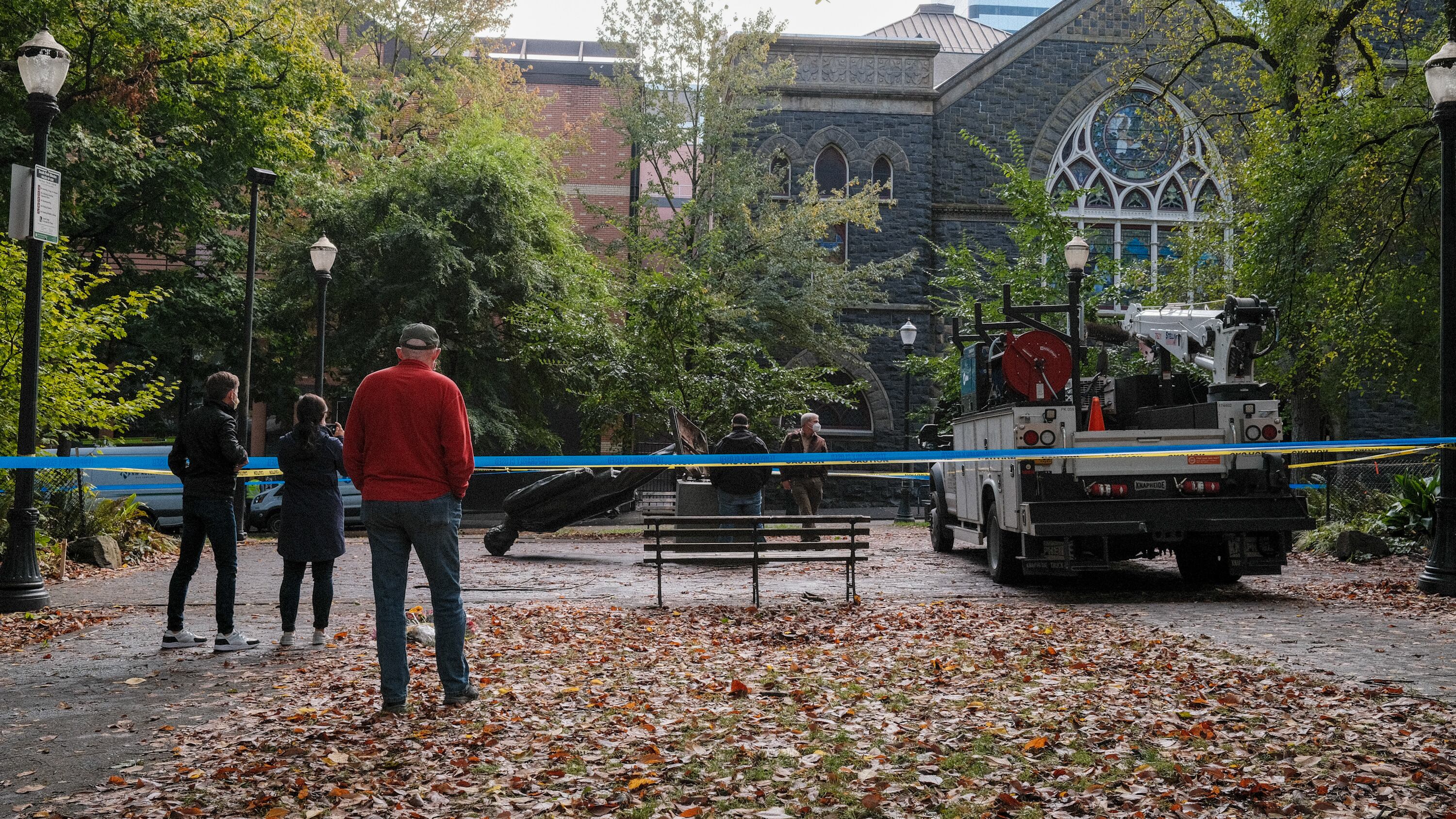The nonprofit that manages Portland’s public art is scheduled to vote Wednesday on a recommendation to city officials that two statues of U.S. presidents torn down amid 2020 protests not be restored to their former pedestals.
UPDATE, 6:20 pm Wednesday, Sept. 29: The Regional Arts and Culture Council board has approved a recommendation to not restore statues of Abraham Lincoln and Theodore Roosevelt to the South Park Blocks, or a sculpture of a pioneer family called The Promised Land to Chapman Square in downtown.
“The recommendation not to return statues to their previous location does not mean that works will be permanently removed from the City of Portland’s public collection,” RACC spokesperson Heather Nelson Kent said in a statement. “The statues include: George Washington, Abraham Lincoln, Theodore Roosevelt: Rough Rider, Harvey Scott, and Promised Land. City officials have decided that Elk will return to downtown Portland.”
The vote by the Regional Arts & Culture Council board is the latest step in a process that began earlier this summer. That’s when arts officials adopted a policy that says public artworks can be removed if the “subject or impact of an artwork is significantly at odds with values of antiracism, equity and inclusion.”
On its website, RACC says the vote concerns statues of Presidents Abraham Lincoln and Theodore Roosevelt on the South Park Blocks. Both statues were toppled during an “Indigenous People’s Day of Rage” event last October.
“On Wednesday, Sept. 29, the RACC Board will consider the Public Art Committee’s recommendation not to return these statues to their previous locations (excluding the Elk),” the nonprofit says on a frequently asked questions page. “This recommendation is consistent with recent action by the Portland City Council recommending new public art representing more diverse cultural identities and histories for the South Park Blocks.”
A RACC spokesperson declined to release the packet of materials the board will examine before making its decision.
The fate of the statues could prove a measurement of how swiftly Portland public opinion has shifted on which historical figures should be celebrated. Both presidents are towering figures in American history. But Roosevelt espoused eugenics and led imperialist wars. And Lincoln, while chiefly remembered for the Emancipation Proclamation, held racist views of Black people and presided over the removal of Native Americans from their land.
The upcoming vote received little notice until Aubrey Russell, a Portland resident, published an Oregonian guest op-ed Tuesday lamenting RACC’s role in deciding the statues’ fate. “Its role as a private nonprofit that contracts with the city to manage the city’s public art,” Russell wrote, “puts it in the unfortunate position of making recommendations on decisions of significant interest to the public, without offering members of the public any opportunity to comment.”
RACC spokesperson Heather Nelson Kent said RACC will conduct a community process to decide what to do with the statues. “If the board endorses the [public art committee] recommendation,” she tells WW, “we would begin a community engagement process to consider removing the statues from the collection, or keep them and find them a new permanent or temporary home.” (The nonprofit has an email portal to receive comments on statues.)
Jeff Hawthorne, the city’s arts program manager, tells WW that the Wednesday vote only starts the next stage of decision-making—this time, by elected city commissioners.
“[RACC] may vote to recommend that the city should not return the historic monuments to their original location,” Hawthorne says. “If and when they do, the city will figure out what to do next. Nothing imminent is happening on our end.”
Hawthorne did raise the possibility of what might replace Lincoln and Roosevelt on the Park Blocks. That location, he says, is among the leading sites being considered for the iconic Elk statue that was removed from Southwest Morrison Street last summer after its base was damaged by bonfires.
